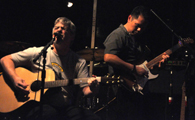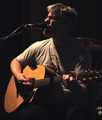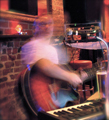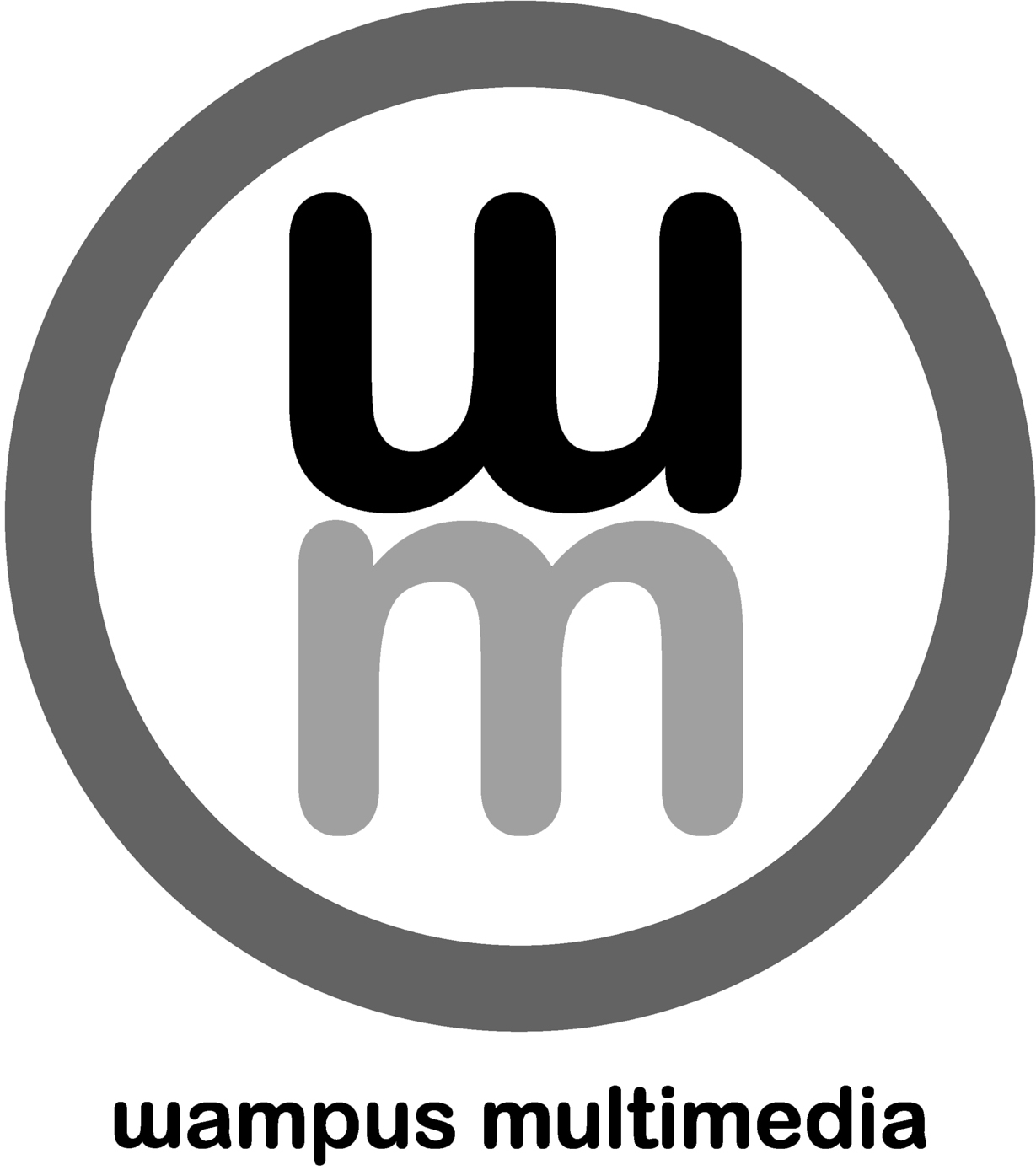Album & Audience: Q&A with Kowtow Popof
 As a contemporary songwriter, are you focused on making albums? Or just singles? Or are you emphasizing your live show, where you can reach your audience more regularly, with greater immediacy? Is creating “proper” albums still a part of your artistic plan?
As a contemporary songwriter, are you focused on making albums? Or just singles? Or are you emphasizing your live show, where you can reach your audience more regularly, with greater immediacy? Is creating “proper” albums still a part of your artistic plan?
While the album has undergone dramatic change in recent years — the “devaluation” of content, the slicing and dicing of linear narrative — it remains the most eloquent way to capture and communicate an artist’s vision. At its best, it is a fixed, detailed representation of an original idea, a document.
Singer-songwriter Kowtow Popof spends a good bit of time thinking about albums, having recorded and released a passel of fine ones since emerging on the indie scene more than 20 years ago. His forthcoming entry, Tastes Like Armageddon, is slated for release on Wampus this winter.
We asked Kowtow about the state of the album in 2012 — for him and for the rest of us.
Wampus: The traditional album has been the main delivery vehicle for music for the last 50 years. Lately there has been a lot of talk about its future — whether or not it can captivate an audience whose need for stimulus increases while its attention span wanes. Are you sticking with albums for your music or do you have other plans?
Kowtow Popof: I’m naturally inclined toward making albums. The kind of music I listened to growing up — Sgt. Pepper’s, Nilsson’s The Point, Tea for the Tillerman by Cat Stevens, to name a few — most likely got me to thinking that way. By the time I started actually creating music, I was already wired to make albums. I doubt for me there’s really any other choice.
I don’t think the album will become obsolete. In rock music, there always seems to be a singles-albums dichotomy going on. The audiences are different. Not that there’s much of an audience for me either way. The kinds of things I’ve thought about doing differently than what I’ve done before have to do with introducing another medium, like video, but still within an album framework. So I guess I’m putting all my eggs in one basket. Just hope they aren’t Great Auk eggs.
If you were going to incorporate video into an album, how might it work? Would the video complement the music, like a music video, or would the two work together more like a narrative film?
When I’m creating music, there’s something visual going on in my head. There’s a sense of a physical place to me. I don’t just mean the song is based on an experience, and I’m visualizing the experience. It’s almost like the song has its own physical reality. I’ve often thought it would be fun to try to tap into that, to try to approximate what I “see.” There’s a Twilight Zone episode where they try to show what the fourth dimension looks like. It’s a little like that. Except inside my head is probably a little more disturbing.
 So I would lean toward doing something abstract, perhaps something found in the everyday, something more about texture, light, and movement and not particularly narrative in nature. This is probably a good thing, since I don’t have the skills to do something more sophisticated than that. If I were to collaborate with a filmmaker, then I’d want to explore how they visually interpret the music. If the idea of adding visuals is to promote the music, it is probably better to call in a professional. But still, it would have to be more something along the lines of the Brothers Quay rather than a Steel Panther video.
So I would lean toward doing something abstract, perhaps something found in the everyday, something more about texture, light, and movement and not particularly narrative in nature. This is probably a good thing, since I don’t have the skills to do something more sophisticated than that. If I were to collaborate with a filmmaker, then I’d want to explore how they visually interpret the music. If the idea of adding visuals is to promote the music, it is probably better to call in a professional. But still, it would have to be more something along the lines of the Brothers Quay rather than a Steel Panther video.
You’re wrapping your eighth studio album, Tastes Like Armageddon, for release later this year. How did your creative process differ on this record, and in what ways was it similar?
Typically I write the majority of my songs on guitar. However, my last album, Exalted Headband, was an instrumental record where I experimented more with composing using music software. TLA is sort of a vocal version of Headband, but with more traditional pop song structures. A lot of the songs are written based on a riff rather than a chord progression.
This ended up being the way I conceived the album as a whole. For most of my records before Headband, I’d have a batch of songs written on guitar that made up the core of the album. So once I went about recording them, the basic gist of the record was already established. For TLA, I was composing the songs as I recorded them; the themes of the album were coming out of the recording process itself. There’s nothing particularly groundbreaking about this, but for me personally it’s kind of liberating. I’m able to break away from convention a little more. It becomes more about discovery and less about procedure.
Do you see this as an evolution away from the “procedural” or as a swing of the pendulum you’re riding at the moment? Some of your past records (like Coaster and Splinters & Threads) play more as classic narrative albums to my ears, while your recent work seems harder to pin down, more abstract. Do you think that’s accurate?
I think that’s pretty accurate. Part of it has to do with subject matter. Coaster and Splinters & Threads are more directly about relationships than my other work, and I think I took a more direct approach in conveying them. There was a beginning, middle, and end to them similar to the relationships they’re about. TLA is more like a set of unfocused snapshots of a possible future, garbled communications from a world on the brink. It’s probably more like my first record.
There’s also something to be said for changing up your approach, taking a different angle than before, so I think that’s part of it too. Perhaps I’ve gotten more abstract because I perceive a lot more gray area than I used to. Or I may just be devolving into inarticulateness.
A big part of getting the work out there nowadays is connecting personally with the audience, rather than simply doing advertising, radio, and so on. You’ve been featuring one of your songs every day on social media, along with a t-shirt from your vast (I’m told) collection. What gave you that idea?
 In the past when I’ve released a record, I’d play a few gigs locally to promote it, and then I’d retreat to the studio to work on the next album, essentially dropping off of the face of the earth for a couple of years. Then I’d release the next one and start the process all over again. It’s a rather quaint approach, as if the Web never happened. I was happy to make records, I just wasn’t very comfortable trying to sell them (which is a pretty quaint idea these days in itself). But it made sense to at least call attention to the fact that I was making a record, and I wanted to do it in some semi-novel way that reflected my personality.
In the past when I’ve released a record, I’d play a few gigs locally to promote it, and then I’d retreat to the studio to work on the next album, essentially dropping off of the face of the earth for a couple of years. Then I’d release the next one and start the process all over again. It’s a rather quaint approach, as if the Web never happened. I was happy to make records, I just wasn’t very comfortable trying to sell them (which is a pretty quaint idea these days in itself). But it made sense to at least call attention to the fact that I was making a record, and I wanted to do it in some semi-novel way that reflected my personality.
I do have a pretty immense collection of t-shirts. Even the people who know me well have not seen the majority of them. Once I came upon the title for the record, it seemed like doing some sort of countdown was in order — end of the world happening on a specific day and all. Aside from my record collection, I don’t have a year’s worth of anything to count down, other than my tees. So, out of that came Kowtow’s T-shirt Countdown to Armageddon.
Being a daily occurrence, I felt like the countdown needed a little more context than simply saying in so many days I’m releasing a record. So I try to include trivia that relates to each shirt. It’s been pretty enlightening, and I’ve found that I’m probably more consistently focused on the record than I might be otherwise. For certain milestones, there are trivia contests to give away my CDs, as well as a t-shirt I’ve had made for the occasion.
I think my t-shirt collection says a lot about me, although mostly it probably says I’m a goof. But Kowtow’s Recipe Countdown to Armageddon just didn’t have the same ring to it.
It’s a novel idea, a great way to frame your conversation with people. They see that other side of you. Are you entertaining ideas yet for future Kowtow albums? How would you like for your relationship with your audience to unfold over the long run?
The next record will likely be a reaction to this one. TLA is willfully electronic, and it’s about the world going to hell in a handbasket. For the follow-up I want to do something stripped down and acoustic, with perhaps piano as a featured instrument. I’ve been listening to a lot of Scandinavian jazz lately. And thematically it would also be an opposite, more about endlessness than the end of things (the working title is Infinite Suns). Obviously I don’t really believe the world ends when TLA comes out.
I think I am always entertaining album ideas. There might be a special cog for that in my brain that is always spinning. I’ve been making records as Kowtow for 25 years in relative obscurity, and I feel like I have a pretty decent collection of songs. I’d like to revisit some of them and put together an album of new versions. If I have an audience, it might be interesting for them to see my catalog from that perspective. Of course, I can’t help but be a little perplexing about anything I do, so the album might be surf renditions. My brother came up with the title — Kowtowabunga!
One last question… Given what you’ve learned from dreaming up and creating albums, what advice would you give to an artist just getting started? What would you suggest they do — and avoid?
Don’t trust anyone giving tips on how to write a song.
(Top two photos by Wayne Hulehan)

Leave a Reply